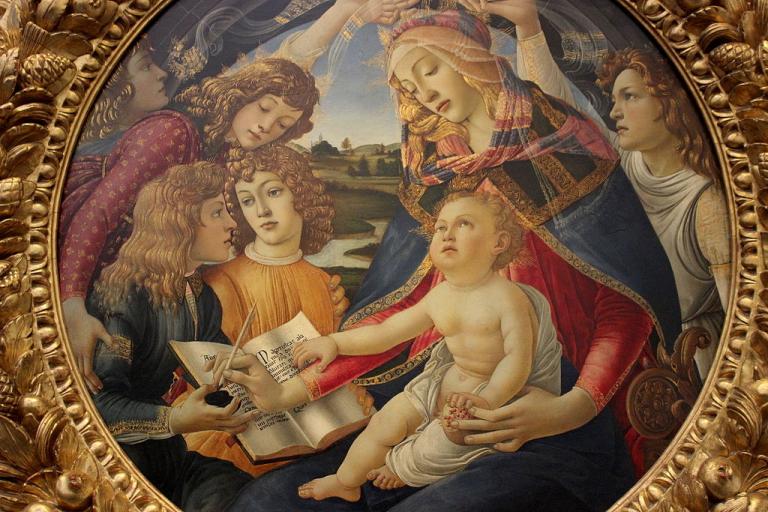The esteemed John Mark Reynolds, a fellow Patheos blogger, has written an excellent meditation on the Magnificat, the song of Mary (Luke 1:46-55). Read it all, but I’d like to extract two of his paragraphs.
From And Mary Said (the Politics of Christmas?:
There were zealots in the neighborhood, people who would not compromise with the tyrants, but she could not join their doomed cause. They associated the kingdom with a political order and her Son, her Divine Son, would build a kingdom not of this world. He was building an Empire of souls, eternal, safe for all time by her intercession.
There were Sadducees in Jerusalem. They had made their peace with Herod and Rome. They had the world, pleasures for their flesh, and the approval of devils. There were treats they could distribute. Mary would have none of it. She knew the Temple and became the Temple for God in the flesh. She wanted God: truth, goodness, beauty.
To complete the parallels, let’s add something about the Pharisees:
There were Pharisees in Nazareth. Seeing that she was pregnant out of wedlock, they would have stoned her as an adulteress. They had the idea that religion is about how good they are. Whereas some poor souls think that and are crushed, the Pharisees were convinced that they have attained righteousness. Whereupon they mistreat people accordingly, proving their sinfulness after all.
But Mary, though innocent of what they would charge her with, exults, “my spirit rejoices in God my Savior” (1:47). In saying that, she is alluding to the name and the identity of her unborn Son.
So the Zealots, the Sadducees, and the Pharisees all missed what was happening with Mary and her Son. And clearly, all three of these factions have their counterparts today.
The Zealots are those who believe Christianity and Christ are all about earthly kingdoms. Thus we have the social gospel of mainstream Protestant denominations. That’s the social gospel of the left, which has been around for quite a while. Now we also have a social gospel of the right, with conservative churches making conservative political action their priority. Certainly, politics are important, in our vocation of citizenship, and Christianity can influence social and political structures. But temporal kingdoms can never be ultimate. And, as Jesus explained to Pilate, “My kingdom is not of this world” (John 18:36).
The Sadducees were the Temple aristocracy. They were the social elite. But they were also collaborators with the Romans, interested in getting along with those in power. They were also theologically liberal for their time, rejecting doctrines such as everlasting life (Matt 22:23). The modern-day Sadducees are the cultural conformists, those who believe that Christianity should change to be in line with the dominant culture. The Zealots of both the left and the right are at least opposed to the status quo, but Sadducees, whether they lean liberal or conservative, want to be the status quo.
The Pharisees are the legalists, the moralists, the self-righteous, the virtue signaling. Nothing wrong with the law, morality, righteousness, and virtue. But Pharisees think they have achieved them. They are blind to their own faults, while being sharp-eyed and attentive to the faults of others. They don’t realize their need for grace, and they refuse to extend grace to others. There are so many Pharisees in churches today that outsiders think this is what Christianity consists of. They do not realize that Christianity is not just about being good, but about being forgiven because we are not good, that Christianity has to do above all with Christ, His atoning death and resurrection, that is, the Gospel.
Zealots, Sadducees, and Pharisees then and now are oblivious to Christ. They don’t really need Him, they think. And although they might enjoy the festivities surrounding Christmas, they do not realize what it means.
Against these mind-sets we have Mary, who sings about the work of God:
51 He has shown strength with his arm;
he has scattered the proud in the thoughts of their hearts.
52 He has brought down the powerful from their thrones,
and lifted up the lowly;
53 he has filled the hungry with good things,
and sent the rich away empty.So much for the proud (the Pharisees, vs. 51), the power-hungry (the Zealots as well as their Roman antagonists, vs. 52), and the rich (the Sadducees, vs. 53). In Christ, the hypocrites are scattered, the politicians are brought down, the liberal theologians are sent away hungry and empty.
And yet, the good news of Christ and for Christmas is for people in all these factions too, and sometimes that Word breaks through. As happened with Simon the Zealot, who became one of the Twelve Disciples (Luke 6:15); Saul the Pharisee who became the Apostle Paul (Philippians 3:5), and Joseph of Arimathea, the member of the Sanhedrin, which would have put him into close association, at least with the Sadducees (Mark 15:43). They all came to know Christ after all.
Illustration: “Madonna of the Magnificat” by Botticelli, via Uffizi Collection, CC BY-SA 4.0 <https://creativecommons.org/licenses/by-sa/4.0>, via Wikimedia Commons














